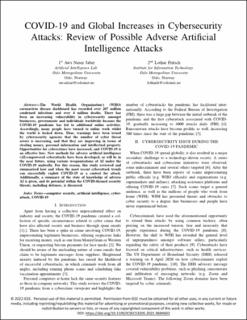| dc.contributor.author | Alzarqawee, Aws Naser Jaber | |
| dc.contributor.author | Fritsch, Lothar | |
| dc.date.accessioned | 2022-10-31T10:41:59Z | |
| dc.date.available | 2022-10-31T10:41:59Z | |
| dc.date.created | 2022-02-04T11:29:57Z | |
| dc.date.issued | 2022 | |
| dc.identifier.isbn | 978-1-6654-1197-4 | |
| dc.identifier.isbn | 978-1-6654-1198-1 | |
| dc.identifier.uri | https://hdl.handle.net/11250/3029084 | |
| dc.description.abstract | The World Health Organization's (WHO) coronavirus disease dashboard has recorded over 207 million confirmed infections and over 4 million deaths. There has been an increasing vulnerability in cybersecurity amongst businesses, gov- ernments and individuals worldwide because the COVID-19 pandemic has led to additional online activities. Accordingly, many people have turned to online work whilst the world is locked down. Thus, warnings have been issued by cybersecurity agencies that the number of cyber threat actors is increasing, and that they are improving in terms of stealing money, personal information and intellectual property. Opportunities for cybercrimes have increased, and COVID-19 is an effective lure. New methods for adverse artificial intelligence (AI)-empowered cyberattacks have been developed, or will be in the near future, using various weaponisations of AI under the COVID-19 umbrella. For this reason, this study reviewed and summarised how and when the most recent cyberattack trends can successfully exploit COVID-19 as a context for attack. Additionally, a summary of the state of knowledge of adverse AI is given, and its potential within the COVID-themed security threats, including defenses, is discussed. | en_US |
| dc.description.sponsorship | OsloMet Artificial Intelligence Lab (Norway) provided full financial support. | en_US |
| dc.language.iso | eng | en_US |
| dc.publisher | Institute of Electrical and Electronics Engineers (IEEE) | en_US |
| dc.relation.ispartof | 25th International Computer Science and Engineering Conference (ICSEC) | |
| dc.relation.ispartofseries | International Computer Science and Engineering Conference (ICSEC);2021 25th International Computer Science and Engineering Conference | |
| dc.relation.uri | https://ieeexplore.ieee.org/abstract/document/9684603 | |
| dc.subject | Computer security | en_US |
| dc.subject | Artificial intelligence | en_US |
| dc.subject | Cyberattacks | en_US |
| dc.subject | COVID-19 | en_US |
| dc.title | COVID-19 and Global Increases in Cybersecurity Attacks: Review of Possible Adverse Artificial Intelligence Attacks | en_US |
| dc.type | Conference object | en_US |
| dc.description.version | publishedVersion | en_US |
| cristin.ispublished | true | |
| cristin.fulltext | original | |
| cristin.qualitycode | 1 | |
| dc.identifier.doi | https://doi.org/10.1109/ICSEC53205.2021.9684603 | |
| dc.identifier.cristin | 1997739 | |
| dc.source.pagenumber | 9 | en_US |
| dc.relation.project | OsloMet - storbyuniversitetet: OsloMET AI Lab | en_US |
